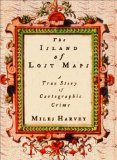

 |

|

The average rating for The island of lost maps based on 2 reviews is 2.5 stars.
Review # 1 was written on 2011-04-03 00:00:00 Adam Burkes Adam BurkesNothing ruins a good book more than an author confusing his quest to find the story with "the story." This book is best when Harvey is relating actual events. He includes several true stories about map thefts or about cartographers that I found interesting because 1. their effect on historical events is obvious, and 2. the stories are generally unknown to the average reader. There are some great stories in the first half of this book. But there is far too much philosophizing in this book, especially toward the end when there is really nothing left to tell about Gilbert Bland or the maps he stole. Harvey admits there was nothing left to tell. In light of this, it would seem that the book should have come to an end. But that is not what happens. Instead, the plot shifts to Harvey's journey to *find* more to tell. And so we are left to read about all the parallels he draws between: himself and Gilbert Bland; his quest and that of another early explorer or cartographer(and another; and then another; and then probably a few more;) his quest and that of Gilbert Bland; the psychological profiles of past thieves and Gilbert Bland; the results of his mother's childhood trauma and that of Gilbert Bland (really?) - (do I need to keep going?) It seems, in the second half of the book, that Harvey found meaning in everything. He needed to tell us about his unplanned 100 miles-out-of-the-way trek to a town called Eldorado. The map told him to go. (I don't get it either...) And even though the trek failed to garner any new information about the story he was researching, it had some sort of romantic meaning to him, so we get to read about it in the book. (Snoooooooore.) In relating all of these events, Harvey kept taking this circuitous route, whereby he interrupted the current flow of the text to go off and describe the meaning he found from the [fill in the blank.] I'm all for some of that. But it was overdone and often fruitless because it rarely advanced the story. I didn't even know what he was talking about by the end. Birds had meaning. Rockets had meaning. Satellites had meaning. I just couldn't stomach it anymore. The book was suddenly about everything. I just wanted it to end. You might think that the moral of this book would be: don't steal maps. But the real moral of the story is this: a story that doesn't end the way you want won't become any more interesting by inserting yourself as the main character. |
Review # 2 was written on 2007-10-21 00:00:00 Richard Glenister Richard GlenisterAs a cartomaniac, a librarian, and a history lover myself, this book seemed to be just the ticket for me. I loved the digressions into the science of maps, notable historic maps, mapmakers, historic map thieves, explorers, map collectors and the map trade. However, I found the story of the map thief to be about as bland as the thief's own name. In fact, the author takes pains to illustrate that thief is a personification of his own name. His is a story not worthy of telling, except as a cautionary tale for all archivists, librarians, collectors and the like who might fall prey to low life vandals such as Bland. His story becomes even more tedious by the end, and then turns into a sentimental author's introspective. I grew tired of the way the author always tries to tie the story of maps into the story of the map thief, as if everything about maps is somehow analogous to this repugnant protagnist. I also thought that the author's attempt to make the entire story applicable to himself, even to the point of drawing an analogy between his own life and that of the thief, as if his whole experience of researching the story of the map thief was actually a journey of self disovery, was pretty weak and contrived. I think I would have rather read this book as two separate works--one a collection of newspaper clippings detailing the arrest of Mr. Bland and the subsequent crime investigation, and another as a brief history of all the varied aspects of the world of maps, including map crimes, of which this map thief's story would merely figure in as one egregious example, rather than as the focus of the entire work. |
CAN'T FIND WHAT YOU'RE LOOKING FOR? CLICK HERE!!!